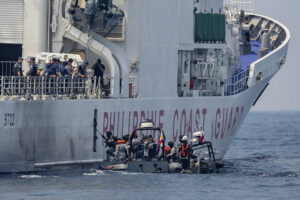Senate ratifies PHL’s Reciprocal Access Agreement with Japan
THE PHILIPPINE Senate on Monday concurred with the ratification of Manila’s military agreement with Tokyo that will facilitate the exchange and combined training of their troops. The Reciprocal Access Agreement (RAA) between the Philippines and Japan eases military cooperation between the two countries, allowing for the entry of equipment and troops for military drills and […]

THE PHILIPPINE Senate on Monday concurred with the ratification of Manila’s military agreement with Tokyo that will facilitate the exchange and combined training of their troops.
The Reciprocal Access Agreement (RAA) between the Philippines and Japan eases military cooperation between the two countries, allowing for the entry of equipment and troops for military drills and disaster response.
Japanese Ambassador Endo Kazuya was present at the Senate plenary when all 19 senators present voted for RAA’s ratification, under Senate Resolution No. 1248.
The deal outlined “the provisions on entry and departure, movement, access to facilities, and professional practice of the visiting force and civilian component for the purpose of cooperative activities,” according to Senator Maria Imelda Josefa Remedios Romualdez Marcos, one of its authors.
It also covered “rules governing the jurisdiction over the actions of the Visiting Force and Civilian Component,” said Ms. Marcos, who chairs the Senate foreign affairs panel, in a statement.
The resolution passed by the Senate cited the need to deepen the interoperability between the Armed Forces of the Philippines and the Self-Defense Forces of Japan by enabling more in-depth practical military cooperation and exercises.
The agreement will expand the defense cooperation of the Philippines and Japan in the maritime domain amid shared security challenges, Ms. Marcos said.
In a courtesy call to Senate President Francis G. Escudero, Ambassador Endo expressed his gratitude and his optimism that the agreement will facilitate the implementation of joint activities between Philippine and Japanese forces as well as promote security and defense cooperation, the Embassy of Japan in the Philippines said in a statement on Monday.
The Japanese envoy also expects the RAA to firmly support peace and stability in the Indo-Pacific region.
Both Mr. Endo and Mr. Escudero have “agreed to work closely together to further deepen Japan-Philippines relations as 2026 approaches, which marks the 70th anniversary of the normalization of diplomatic relations between the two countries,” the statement further read.
Both countries signed the deal in July to ease the entry of military equipment and troops for combat training from Japan.
The agreement is the first of its kind to be signed by Japan in Asia and coincides with increased Chinese assertiveness in the South China Sea, where Beijing’s expansive claims conflict with those of several Southeast Asian nations.
A United Nations-backed tribunal based in The Hague in 2016 voided China’s expansive claims in the sea for being illegal. Beijing has ignored the ruling.
The Philippines has a visiting forces agreement with the US and Australia. Tokyo, which hosts the biggest concentration of US forces abroad, has a similar deal with Australia and Britain, and is negotiating another with France.
Japanese Foreign Minister Yoko Kamikawa has said her country’s partnership with Manila is not targeted against any country but aims to boost efforts towards peace and stability in the region.
The ratification of the RAA also followed Japan’s move to provide P611 million worth of security assistance to the Philippines, which includes radar systems, inflatable boats, and other maritime equipment. — Kyle Aristophere T. Atienza












